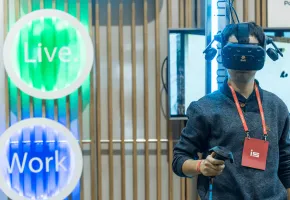 08.07.2019
08.07.2019
Why do we need women-focused hackathons to close the gender gap in the tech industry and boost entrepreneurship?
It is true that every accomplishment starts with the decision to try. But sometimes you need to fuel inspiration and shape the decision-making process. While the key trigger to try is the mindset and determination, we cannot ignore the external factors shaping the path to success.
“I was intrigued by this Empowering Women Hackathon right away and decided to register, as the Empowering Women theme really grabbed me. I’ve been to other hackathons before, but it was always too male dominated – as if the tech business has to be always about men.” - Mariana Miakush, hackathon participant.
It is true that every accomplishment starts with the decision to try. But sometimes you need to fuel inspiration and shape the decision-making process. While the key trigger to try is the mindset and determination, we cannot ignore the external factors shaping the path to success. Let’s be honest; the road to success for women and minority groups has always been and will always be bumpier due to stereotype-loving decision makers. That’s why hackathons are simply one of the best nudges to drive change.
Let’s dig deeper with an example. Home to an estimated 40-plus million people, Ukraine has recently become a hub for outsourced IT labour in Europe, given its lower costs and the fundamental tech-talent of its young generation. IT is now the country's third-largest export sector, behind the traditional titans of agriculture and mining. Growth in the sector has led the country to give birth to so many startups that have proven themselves highly promising and profitable. Despite the academic and technical opportunities available to both genders in urban areas, today the ICT sector in Ukraine is predominantly male: 84% of the total labour force, to be exact. One of the main reasons is that the majority of women across the country is still considered as full-time housewives due to the traditional mindset of the society. Most women in Ukraine are still faced with archaic questions about when they intend to start a family and are expected to prioritise family and husband, rather than career and self-actualization. Those who have a career are pushed into lower paid jobs, and as the ICT sector provides the highest paid vacancies in Ukraine, women end up working in lower paid vacancies. And so, the gender wage gap increases as a natural outcome. At the end of the day, Ukraine draws a portrait where women watch but cannot grab a piece of this fast-developing, profitable industry – or at least not quite enough of it.
Even though the Ukrainian ICT sector is often showcased as a positive example in the midst of this ongoing crisis, as a catalyst for sustainable economic growth, its potential is hampered by a lack of entrepreneurship skills and insufficient access to a diverse labour force. Therefore, it is necessary to facilitate more opportunities for Ukrainians to build professional skills and develop their entrepreneurial mindsets and ideas, especially for women and people from conflict-affected areas.
While the common attitude toward women’s career life can be quite demotivating and even dissuasive, the women of Ukraine seem to have started to seek more and become a part of a widening economic trend, including leadership positions in tech-business life.
Today, hundreds of women-oriented hackathons are being organized all around the world to offer that little extra nudge to enable women to reach their dreams and potentials. And more well-resourced events should continue to be organized until gender stereotypes are left behind. Eastern Europe, for instance, is working hard to mobilize women to take the entrepreneurial path as a response to the current status of tech-business life dynamics regarding gender.
As Daniela Godoy, Head of Internationalisation at Estonia e-Residency once stated, “It is crucial to help unleash the world’s entrepreneurial potential.”
Today, Estonia has one of the highest rates of startups per capita in Europe, with the support of government and UN technology and small business initiatives. The mindset is focused on cultivating the entire entrepreneurial ecosystem regardless of gender or nationality. As a result, many leading startups are today run by strong female figures. Dedicated startup communities and hackathon organizers, such as Garage48, have launched a women-focused hackathon series in Ukraine to help them overcome societal challenges, in order to reach the desired state of success as a nation. It is noble and inspiring to see such cross-border collaborations. From one IT-genius country to another, Estonia took it as their mission to unleash Ukraine’s true entrepreneurial potential by embracing every single talent across the nation, disregarding gender-based stereotypes. In fact, this is the key attitude and the message that should be emphasized: It is not a feminist movement; it is simply all about unleashing a nation’s entrepreneurial potential.
It has been proven that gender equality in the workplace increases productivity and results in greater efficiency. While men may be more ambitious and aggressive, women are known to be more disciplined and results oriented. Once this combination of masculine and feminine approaches falls in the right place on the business spectrum, it simply outperforms single-gender dominated workplaces. We all should take part in this movement, if not to stop inequality, then simply to achieve greater productivity. Either way, it is a win-win result for everyone.
“This isn’t just about women in tech; this isn’t just about getting more women to work in startups or leadership positions. This is about generating the right atmosphere to create ideas that can really empower women in their daily lives,” stated Joao Rei, host of an Empowering Women Hackathon in Ukraine. “Through these events, we aim to inspire and empower women of all ages to push them out of their comfort zone and take the control of their lives.”
Joao’s input describes our mindset quite clearly. Change can only come about by doing the work on a grassroots level, and what we can do is to create an ideal atmosphere to boost the impact and alter the current dynamics. The rest is up to the hackathon participants. Getting out of the comfort zone and making an impact through trend-shaping ideas means that they need to be ready and determined to work hard and challenge themselves, while feeling the inner and professional growth. As the president and CEO of IBM once stated, “Growth and comfort do not coexist.”
Nilay Rammul works as Marketing Manager at Garage48, an Estonia-based global hackathon organiser and enabler of promising venture entrepreneurs. More articles about startups, business and new tech trends you'll find in Growth with Tech Magazine. You can download it here.
Tags:
See also:
LATEST NEWS
Od czego zależy sukces wdrożeń AI? - polskie i amerykańskie trendy w branży tech 24.10.2025
Five highlights from EU Space Days 2025 13.06.2025
🤝 Networking i zabawa na Infoshare 2025 30.04.2025
⭐ Spotkaj liderów innowacji | Keynote Speakers 23.04.2025
🎸 Zagraj na Great Networking Party | Call for Bands 16.04.2025
🏆 Gdańsk Startup Award – Twoja Szansa na Sukces! 09.04.2025


